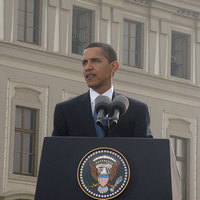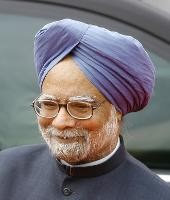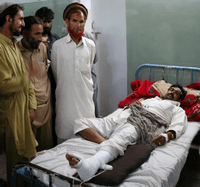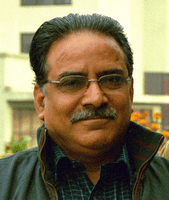I highly recommend this account by Bruce Tolentino at In Asia about the flag-lowering ceremony that is performed each day before packed ampitheatres on both sides of the only India-Pakistan border crossing: Then, simultaneously, the guards from each side launch repeatedfusillades of choreographed marching and gestures. Aggressively, theyrush the border, furiously stamping their feet, glaring and snorting attheir foes. They stop – inches from one another, never crossing theborder – raise their arms to shoulder height and display thumbs pointeddownward, dismissing the other. Excitement and tension among the crowdsrepeatedly builds and swells, erupting in applause for their respectivenational warriors. This […]
South Asia Archive
Free Newsletter
Yes, well, this is no surprise, really. I’d be pretty keen on directing a major potential competitor far away from the market I’m trying to corner, too. And if I could make some money on the deal, all the better. Unfortunately, the last “I” — for India — is no longer a sure thing on the IPI “Peace” Pipeline. The stabilizing effect that would have had would have made the deal at least a palatable trade-off for losing Iranian gas for Nabucco. Now I’ve seen some reports that the Iranian gas might end up in China after transiting Pakistan. If […]
Chinese involvement to help Pakistan in its counterinsurgency efforts makes perfect sense. The relationship between the two countries was the reason we included China in last fall’s WPR feature issue, The Asian Triangle. At the time, with the “regional solution” still focusing on India-Pakistan, the idea didn’t yet have so much public traction. Indeed, the issue appeared days after the Mumbai attacks, which drilled the focus down even further on the two South Asian neighbors. But China’s partnership with Pakistan and rivalry with India is a major aspect of the South Asian equation. And for reasons that Arif Rafiq made […]

New York and Washington may be separated by only a few hundred miles, but in the last few weeks, they have appeared to be light years apart on arms control and nonproliferation issues. In New York, representatives of more than 100 countries worked from May 4-15 to prepare for next year’s nuclear Nonproliferation Treaty review conference. Buoyed by U.S. President Barack Obama’s April pledge to seek a world free from nuclear weapons, their work was marked by a spirit of cooperation and compromise that had been noticeably absent during the eight years of the Bush administration. They approved an agenda […]
I’m not sure I’d characterize the summit between the presidents of Afghanistan, Pakistan and Iran as “the latest sign of Iran’s emergence as the regional power,” as does the NY Times. I might think otherwise if Indian Prime Minister Manmohan Singh had joined them. But he didn’t, meaning this is basically the diplomatic equivalent of a block association meeting. It certainly can’t do any harm, could even do some good, and far from being an example of our inability to isolate Iran, is exactly the sort of thing that we should be — and increasingly have been — encouraging. But […]
Is there any other country on earth about which this sentence could be written? Despite being rigidly observed, Japan’s 1976 ban on arms exports was never passed as a law. Interesting to note that the only exception made to the ban to date was with regard to missile defense technology to address North Korean proliferation threats. As troublesome as the now-nuclear DPRK is to all parties involved, the major destabilization risk, outside of a sudden collapse of the regime, still involves Japan’s potential response. Even if it predates today’s test, the proposed lifting of the export ban comes in the […]
Both the New York Times and the Washington Post reported this week that a political deal was under discussion between Afghanistan’s President Hamid Karzai and Zalmay Khalilzad — the former U.S. ambassador successively to Kabul, Baghdad, and the United Nations, and until recently a possible, if undeclared, contender for the Afghan presidency. The talks centered on Khalilzad, an Afghan by birth, being appointed to a non-elected post described as chief executive officer, to put sinew into Karzai’s weak, inefficient, and — from Washington’s point of view — unreliable government. Both Karzai’s office in Kabul and Khalilzad himself at once denied […]
Just when Pakistan was beginning to get serious about its counterinsurgency efforts against the domestic Taliban in Swat and FATA, the German national security council put the kibosh on a previously approved Pakistani purchase of three German submarines. The Germans cited concerns about the stability of the Pakistani government, while ignoring the submarines’ central role in fighting off the Taliban threat. . . . Oh, wait. Maybe the subs weren’t meant for the Taliban, after all. Hmmm. I wonder who they were meant for? Seriously, Pakistani strategic calculations have not changed, and quite frankly, it’s hard to argue with them. […]
Rob over at Arabic Media Shack has made this point a few times recently, and it’s one worth repeating. When people — like me — say, “Al-Qaida is in Pakistan,” just what do we mean? We need numbers. Like how many people? After all,wouldn’tknowing the exact number offighters tell us something about thestrategic significance of the threat? 50 would obviouslybe lesssignificant than 400; 2,000 would definitely be moreworryingthan500. But how come we never hear this question being asked?There is one exception that I noticed recently. John Mueller, writing in this month’s issue of Foreign Affairs, putsthe number of people in […]

NEW DELHI — The unexpected landslide victory of the Congress Party in India’s general elections has unshackled the incoming government from the tricky task of managing its earlier coalition for political survival, especially the rabidly anti-American Left parties. There is little doubt that the team of Prime Minister Manmohan Singh, all-powerful Congress party president Sonia Gandhi and her son Rahul Gandhi — who led the election campaign — will look to firm up some of their earlier aims, given the near-majority and stability that the party and its allies now command. In fact, the new government can no longer offer […]
U.S. and NATO forces in Afghanistan have established an experimental security force drawn from local Afghan fighters, in a bid to better provide the street-level security that has proved instrumental to defeating entrenched insurgencies. Despite tens of thousands of incoming American reinforcements, most Afghan districts still do not have a permanent troop presence to defend against Taliban incursions. The new Afghan Public Protection Force “enables respected young men of local communities to become public protectors,” said U.S. Army training officer Capt. Marco Lyons. But the force, currently operating only in Wardak province, just south of the capital of Kabul, risks […]
Time constraints this week force me to actually blog, instead of posting my usual long-form essays to the blog page. So quickly, a few thoughts on the Celeste Ward op-ed in the WaPo over the weekend, which Andrew Exum flagged. The question of the Surge narrative is central to Ward’s piece, which amounts to a critical corrective to the COIN “fad.” But I found this the more interesting thread: It still isn’t clear to me that what we faced in Iraq was aninsurgency. There were many different conflicts raging simultaneously:anti-occupation movements, struggles among and between ethno-sectariangroups, the presence of foreign […]

MARDAN, Pakistan — Zeeshan Khan, a 17-year-old engineering student, says he knows who Pakistanis blame for what has become the largest migration in their country’s history. “These people are coming due to the bombing,” he said, gesturing to the thousands of refugees milling around the Mardan refugee camp. “Due to the jet artillery, the F-16s, the heavy weapons. All our houses are destroyed.” More than 900,000 people have left their homes in and around Swat valley in the last few weeks, adding to a total of 1.4 million people displaced so far by fighting between the Pakistani Army and militants. […]
Richard Haass on his policy differences within the Bush administration: I argued for a new Iran policy and lost. I argued for a diplomaticapproach to North Korea and lost. I argued for a serious approach tothe Palestinian issue and lost. I wanted to deal with Syria, and I loston that. I also didn’t understand the allergy to internationalinstitutions. At some point, you run out of fingers to add up yourdisagreements. From an interview on wars of necessity vs. wars of choice over at Real Clear World. Interestingly, Haass obliquely underlines the disconnect between strategic objectives and resources that has plagued […]
The Indian government released a disturbing report this week on the extent to which child prostitution and trafficking for sexual purposes has become a major issue for Indian law enforcement. According to Indian Home Secretary Madhukar Gupta, there are an astounding 100 million people involved in these practices in one way or another. Of the more than 3 million sex workers in India, it is estimated that 40 percent of them are children. To illustrate the extent of the problems faced by millions of Indian children, the father of one of the stars of the recent hit-movie Slumdog Millionaire recently […]
By all accounts, the Obama administration’s new Afghanistan-Pakistan strategy, and the troop increase to implement it, is a counterinsurgency approach to counterterrorism. In other words, the primary objective is no longer to build a stable Afghan state, and the primary enemy is no longer the Taliban per se. Instead, the tactics of population-centered warfare learned in Iraq will be applied to Afghanistan and the Taliban insurgency, but only in order to target al-Qaida more effectively. The appointment of Gen. Stanley McChrystal — a dyed-in-the-wool COIN man — as commander of U.S. forces in Afghanistan is seen as cementing this approach […]

On the face of it, the case for firing the Nepalese Army chief, Gen. Rukmangad Katuwal, was fairly straightforward. Katuwal had ignored an executive directive on inducting former Maoist guerrillas into Nepal’s armed forces, as per the November 2006 peace treaty that ended a bloody insurgency dating back nearly a decade. As if that weren’t enough, he was also rumored to be planning a coup against the civilian government. But instead, it was Maoist Prime Minister Puspa Kamal Dahal — commonly known by his nom de guerre, Prachanda — who ended up resigning, after Nepalese President Ram Baran Yadav overruled […]
